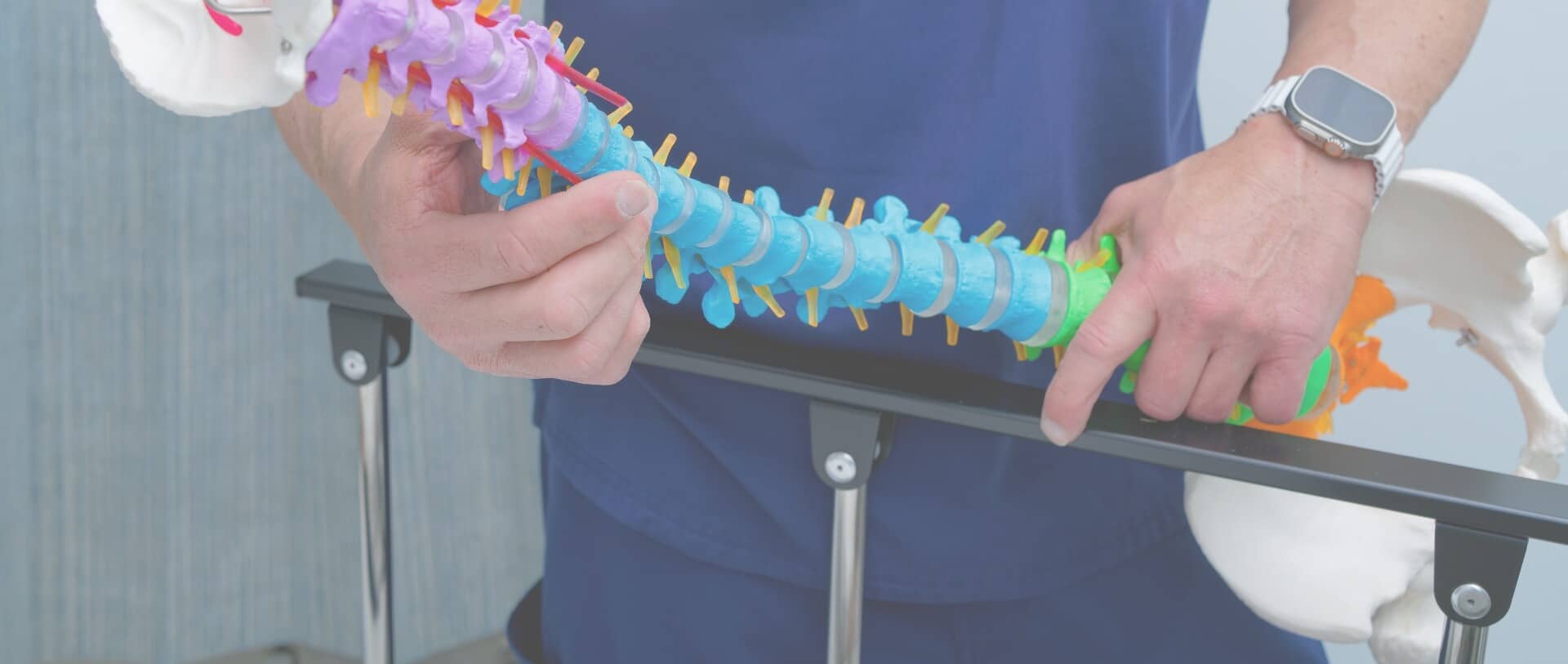
CONDITIONS
Radiculopathy
Experiencing a pinched nerve in your spine can be quite uncomfortable, whether it’s in your neck or lower back. Even thoracic radiculopathy, or a pinched nerve in the mid-back, can still cause bothersome back pain and other symptoms even if it is less common. Fortunately, you don’t have to endure it. Come see the skilled spine team at Gottlieb Spine, serving Dallas and Irving. They specialize in treating radiculopathy and are well-versed in surgical options if necessary. Take the first step towards relief and book an appointment today.
What is Radiculopathy?
Radiculopathy is a condition caused by compression of a spinal nerve root. It affects the control of nearby muscles and even the sensation from that region. There are three kinds of radiculopathy:
- Cervical radiculopathy: Generally associated with upper body symptoms
- Thoracic radiculopathy: Less severe than other types of radiculopathy
- Lumbar radiculopathy: Results in lower body issues
A nerve root refers to a nerve that exits the spinal column and extends to various parts of the body. Nerve roots play a crucial role in transmitting signals between the spinal cord and other parts of the body, including muscles, skin, and other nerves.
When a nerve root becomes inflamed or damaged, it can result in pain, numbness, weakness, or diminished reflexes. In addition to experiencing pain, a pinched nerve can also manifest discomfort in the associated extremities.
Each type of radiculopathy has its own distinct set of signs and symptoms that manifest differently in individuals based on which nerve is compressed. Knowing the type you have can help guide treatment decisions and bring comfort in knowing the reason behind your pain.
What are the Symptoms of Radiculopathy?
The symptoms of radiculopathy can vary depending on the specific location and affected nerves. Some common symptoms of lumbar radiculopathy, which affects the lower back, include:
- Tingling in your legs
- Weakness in your lower body muscles
- Shooting pain down your legs
- Back pain
- Loss of reflexes
- Muscle spasms
Before starting lumbar radiculopathy treatment, your doctor will need to rule out other conditions that could be causing similar symptoms, such as arthritis, inflammatory bowel disease, fungal infections, vascular conditions, and tumors.
How Does Radiculopathy Occur?
The spinal nerves that exit the long thoracic section of your spine from the spinal cord control various functions of your body. These root nerves provide sensation and motor control to different areas, including your back, trunk, chest, arms, and internal organs. The length and complexity of your thoracic spine make these nerve roots vulnerable to injury or damage.
Any external factor, such as bones, tendons, muscles, disc material, or tumors, that puts pressure on a nerve root can disrupt its function. This leads to a pinched nerve in your back, also known as radiculopathy. The compression results in neurological issues, pain, and other related problems.
What Causes Radiculopathy?
Radiculopathy can be caused by degenerative changes in the vertebrae, a damaged disc, or an injury. During your evaluation at Gottlieb Spine, diagnostic tests will reveal the underlying cause of your spinal issue. Once an accurate diagnosis is made, your doctor will recommend the most appropriate treatment.
Some common causes of cervical radiculopathy include:
- Herniated disc: This occurs when a spinal disc ruptures, putting pressure on a nerve root.
- Spinal stenosis: The bones surrounding the spinal canal push inward, resulting in nerve root compression and symptoms like pain, numbness, or weak reflexes.
- Degenerative disc disease: With age, spinal discs weaken and may cause similar symptoms as a herniated disc.
- Trauma or sudden force: Injuries, including spinal fractures, can lead to the formation of bone spurs that pinch the nerve roots.
- Spinal infections: Inflammation from an infection can cause compression of nearby nerves.
- Spinal tumor: Although rare, the growth of tumors on the spine can lead to radiculopathy symptoms.
How is Radiculopathy Treated?
Our spine doctors will carefully consider the specific type of radiculopathy you’re experiencing to determine the most effective treatment for you. Radiculopathy lumbar region treatment may differ slightly from thoracic radiculopathy treatments, for example.
Recommended treatments may include:
- Physical therapy: Strengthening exercises and postural corrections provide better support for your spine.
- Medication: Your doctor may prescribe anti-inflammatory medications to reduce pain, and inflammation, and improve your range of motion.
- Spinal injections: Steroid injections are used to alleviate pain, reduce swelling, and prevent nerve inflammation, providing temporary relief.
- Activity modification: Your doctor may advise you to avoid strenuous activities for a period to minimize the risk of further damage and pain.
- Immobilization: To prevent aggravating damaged spinal nerves, your doctor may recommend a collar, splint, or brace.
If your pain persists even after these treatments, you may need to consult a spine surgeon. Dr. Jamie Gottlieb of Gottlieb Spine specializes in minimally invasive procedures and complex spine conditions.
What is Lumbar Radiculopathy Surgery?
Spine surgery can be a long-term solution for cervical, thoracic, and lumbar radiculopathy. The goal of surgery to is address the compression or irritation of spinal nerve roots, which is the primary cause of radiculopathy. Surgical options for this condition include:
In addition to lumbar radiculopathy surgery, it is recommended to maintain a healthy body weight, exercise regularly, and adopt proper lifting and posture habits.

Top Quality Care at Gottlieb Spine
At our spine center in Texas, Dr. Gottlieb offers a comprehensive and friendly approach to treating cervical radiculopathy. Our treatments range from non-invasive spinal procedures to minimally invasive spine surgery. If you are experiencing pain, discomfort, tingling, or weakness in your neck, back, legs, or arms, we encourage you to reach out to our practice. Call today to schedule an appointment.
SCHEDULE A CONSULTATION